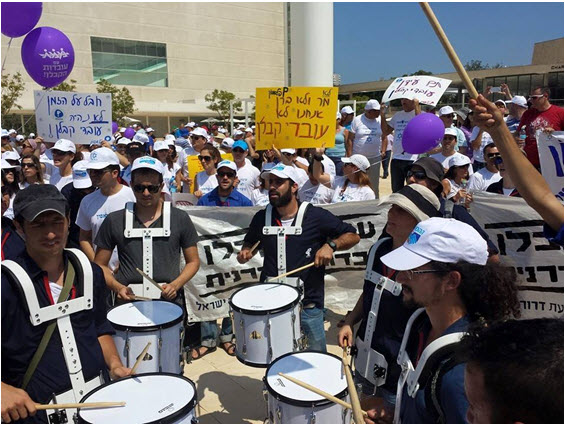If no understandings are reached in the coming days on the employment of contract labor in the public sector, the Histadrut (General Federation of Labor in Israel) will declare a general strike this Wednesday, July 22. The strike is being called to pressure the Ministry of Finance to reduce the number of contract workers in the civil service. Histadrut chairman Avi Nissenkorn met on Sunday with Minister of Finance Moshe Kahlon in an attempt to find a solution acceptable to both sides.

Thousands of contract workers, Jews and Arabs, protested on Thursday, July 16, at the Habima Square in downtown Tel-Aviv as part of the struggle being waged by labor unions to reduce the number of contract workers being employed by public institutions. (Photo: Pelephone Workers Union)
The strike will also include government ministries, support units like the National Insurance Institute and the Israel National Employment Service, and the religious councils, the Israel Postal Company, the Enforcement and Collection Authority, the Israel Tax Authority, the ports, child care centers run by WIZO and Na’amat, the banks, the Ben-Gurion international airport, the airports of Tel-Aviv and Eilat, the Tel Aviv Stock Exchange (TASE), agricultural produce and marketing councils, and the universities’ secretariats. The strike will also extend to the local councils: garbage will not be collected, there will be no office hours, and parking inspectors will not issue tickets. Private sector companies organized by the Histadrut will also be impacted.
200,000 workers serving in the public sector are currently employed via personnel agencies. The Histadrut is demanding a commitment from the Ministry of Finance that workers in core areas be direct government employees. This includes social workers, teachers, school nurses, hospital cleaners, etc. The Ministry of Finance is willing to hire workers directly, but is demanding that the Histadrut allow “management flexibility,” which will enable “managers to operate without fear of sanctions and strikes.”
The parties have been conducting talks on the issue in recent weeks. No agreements have yet been achieved. Speaking at a demonstration attended last week by thousands, Nissenkorn emphasized that the Histadrut had no intention of giving way. “Just like we raised the minimum wage and brought workers with disabilities to center stage, contract workers won’t be at the bottom of the public agenda… The strike that will begin Wednesday will be a tough one, and will include the public services. Even if it’s a long strike, we won’t stop before we have brought about a change,” he said.
Hadash (the Democratic Front for Peace and Equality – Communist Party of Israel) fraction in the Histadrut welcomed the decision to call a general strike, as has Hadash MK Dov Khenin (Joint List) who said he would introduce a bill on the first day of the general strike to eliminate contract work in the public sector. “There are hundreds of thousands of workers without job security and fair work conditions,” Khenin said. “It’s only fitting for the public sector to serve as an example for all bodies that hire contract workers and to stop the spread of the phenomenon.”
Related:


